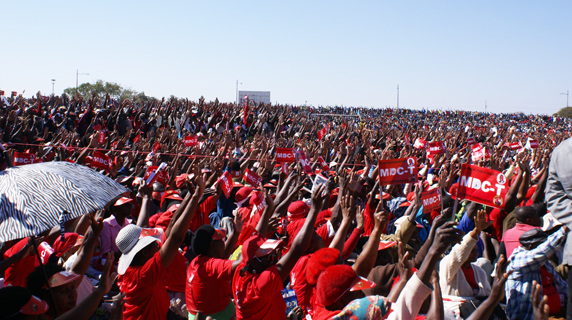
LEROY Muzamani from Harare’s low-income suburb, Highfield, sits with his chin resting on his hands.
Dressed in a worn shirt, shoes that have been repaired multiple times and a pair of oversized trousers, he waits by the public works department in the capital, hoping that he will be hired by them to work as a casual labourer for the day.
“We always hunt for casual jobs that are not even there. Since (the) 2002 elections, many of us have placed our hopes on our political leaders, thinking they would solve our unemployment problems, but alas,” Muzamani said.
“If main political actors are really failing, it means there is ground for other political forces to emerge.”
Muzamani is a professional marketer who has never been employed in his qualified profession. And he blames the government for not prioritising the plight of Zimbabwe’s jobless.
According to the Reserve Bank of Zimbabwe, the country’s unemployment rate was 10,70% in 2011. However, the United Nations World Food Programme estimates that Zimbabwe’s unemployment rate is as high as 60%.
Consequently, like many other Zimbabweans, Muzamani has lost hope in the political course this Southern African country is taking.
“We have many unanswered questions right now as we (endure) hardships, wondering about who shall really change the dynamics of our politics for the better. The major political parties have proved to be failures as they are seized with internal power struggles,” he says.
- Chamisa under fire over US$120K donation
- Mavhunga puts DeMbare into Chibuku quarterfinals
- Pension funds bet on Cabora Bassa oilfields
- Councils defy govt fire tender directive
Keep Reading
The ruling Zanu PF is ridden with internal fissures as factional groups are said to be positioning themselves to succeed their 90-year-old leader, president Robert Mugabe.
One Zanu PF faction is reportedly led by the country’s, and party’s, vice-president Joice Mujuru.
The Zanu PF secretary of legal affairs Emerson Mnangagwa allegedly leads another.
The opposition MDC-T is equally ridden with divisions amid calls for its leader Morgan Tsvangirai to step down due to his repeated failure at the polls since 2002.
In February, the deputy secretary general of the MDC-T, Elton Mangoma, wrote a letter to Tsvangirai, urging him to step down and pave the way for a new leader with fresh ideas.
However, this did not go down well with Tsvangirai’s supporters in the party, who pushed for Mangoma’s suspension. It consequently caused anxiety for many Zimbabweans like Muzamani who feel political leaders here offer them no hope for a better future.
“There is growing confusion among ordinary Zimbabweans as to which political leaders to entrust their hopes; they now doubt Mugabe, and they also equally now doubt Tsvangirai,” political observer Whatmore Makokoba said.
Civil society leaders are also sceptical about the future of Zimbabwe’s main political parties.
“With fissures widening in Zimbabwe’s major political parties, Zanu PF and MDC-T, for them really the future looks uncertain. Both may be headed for their Waterloo,” Claris Madhuku, director of the Platform for Youth Development, a democracy lobby group here said.
Independent political analyst Malvern Tigere said that it raises the question of “who shall Zimbabweans follow now between a failure and failure?”
“First it was Mugabe who raised Zimbabwe’s hopes at independence from Britain in 1980 when he came to power. But his government only helped to diminish the gains made during the colonial era and now many Zimbabweans look back to the colonial era with nostalgia,” Tigere explains.
“Secondly, we have Tsvangirai who kindled the hope of a departure from Mugabe’s grip on power, but is now personally mired in leadership wrangles in his own party, rendering millions of his supporters disillusioned.”
But the country’s major political parties don’t see it that way.
“Zanu PF has a history of an unquestionable degree of unity since its formation over half a century ago and it remains a trusted political party by Zimbabweans to this day,” Zanu PF national spokesperson Rugare Gumbo tells IPS.
MDC-T national spokesperson Douglas Mwonzora is equally confident of his party’s leadership.
“MDC-T remains the only alternative for real change in Zimbabwe. It’s an organised party unshaken by fallacious rumours of fissures spread by our detractors,” he said.
But sociopolitical commentator Brian Mateyo tells IPS: “if main political actors are really failing, it means there is ground for other political forces to emerge.”
David Chidende, programmes officer for Youth Information and Education for Behaviour Change, a democracy lobby group, does not rule out civil unrest.
“Civilian-led uprisings could happen, but it’s not too obvious. Young people have to restrategise and form a mass movement that will champion the democratic course for this country. As the youth of this country, we are the most affected, and if we relax, we risk suffering in perpetuity,” Chidende said.
Muzamani says it may be the only way to enforce political change.
“As betrayed ordinary people, we shall be one day forced by circumstances to take matters into our own hands and lead the struggle for political change on our own,” he says.
—IPS










